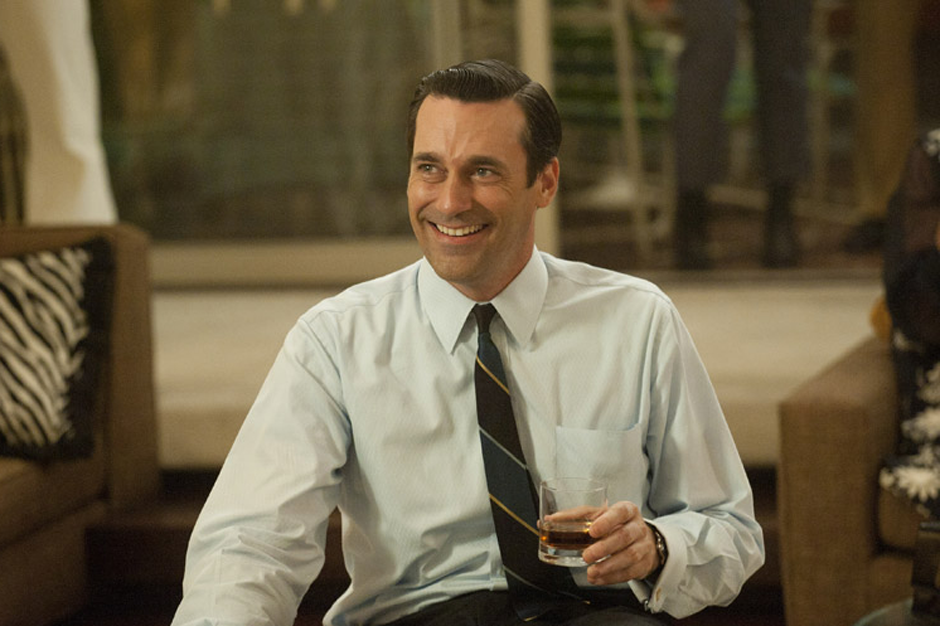Mad Men returned last night after 17 months, a hiatus twice as long as the time that elapsed during the series. The story left off in late 1965 and picks back up on Memorial Day of 1966, and from the black applicants at the SCDP office to Megan’s eye-popping cover of the ye-ye tune “Zou Bisou Bisou” during a brutally awkward party scene, one thing is clear: The ’60s, in their definitive, counter-cultural essence, have finally arrived.
It’s the year rock music broke, the amazing aesthetic spring a year prior to the Summer of Love. The Stones’ Aftermath is only a couple of months old, Pet Sounds just arrived, Blonde on Blonde is a few weeks away, and Revolver will appear in August. It’s all happening RIGHT NOW and how the characters react to it, how they even recognize what “it” is, guarantees that Mad Men will be television’s most compelling series, at least for the next 11 weeks.
Mad Men has always been about historical change, work, and people’s relationship to both, themes that are reflected in the series’ central question: “Who is Don Draper?” Is he a womanizing alcoholic and self-invented suit? Is he Mr. Jones in the Dylan sense: “You raise up your head and you ask, ‘Is this where it is?’/ And somebody points to you and says ‘It’s his,'” someone who will be unable to adapt to times that are a-changin’ in his own lobby? To Mad Men‘s credit, nobody has an “ah-hah” moment about race and privilege in the wake of the Y&R disgrace. Indeed, Don’s biggest Mr. Jones moment comes when he says, of the water bombs dropped on civil rights protestors, “It was funny.”

Also Read
The Greatest TV Antiheroes of All-Time
On the other hand, maybe he’s a man with a moral sense, sometimes mature, like in his complicated relationship with Anna Draper, and sometimes evolving — his notebook scribblings in season four were those of a guy perhaps new to introspection.
What we did not expect him to be was happily (?) married to a hot wife (again). Season five opens six or seven months since he impulsively asked his secretary Megan (Jessica Paré) to marry him after watching her clean up a milkshake. Now Don, on the cusp of 40 (Dick Whitman passed the milestone several months earlier), is that most egregious of clichés — the guy who nailed the babysitter, then married her. A dude fooling around on his wife is dangerous. A divorced, middle-aged father dropping off his kids at his ex-wife’s is something altogether sadder — notice the quiet, oddly vulnerable look on Jon Hamm’s face, one of the most expressive on television, as the kids tumble out of the car. (January Jones is mercifully absent for this episode, as well as most of the season, according to creator Matt Weiner.)
And as for work, Don suddenly, strikingly, doesn’t seem too interested in it. Sterling Cooper Draper Pryce is not growing and he openly says he doesn’t care, subsumed instead by Megan’s youth and sexuality. Megan got a promotion in the interim and works in creative with Peggy, who didn’t have to sleep with anyone to get there, though that doesn’t seem to outrage Peggy (yet). She seemed sufficiently chastised by Megan’s anger with her in the wake of the party, although perhaps she understands that she’s taking the brunt of the blame for Don: “You’re all so cynical,” Megan pouts, just two days after putting on a burlesque show in front of all of her coworkers. “You don’t smile, you smirk.” What does concern Peggy is how “kind and patient” Don has become, and we can’t blame her. A happy Don Draper is an odd thing indeed.
By contrast, the ever-unctuous Pete Campbell (Vincent Kartheiser, whose hairline is retreating so fast they actually bring it up on the show) is not happy; he’s gunning for Roger Sterling’s office, if not his lifestyle. Sterling is still hilarious, but he’s no longer the guy with the sexiest trophy wife, and he’s losing his touch — can you imagine the Roger of season one or two getting played so easily by Pete? But Pete will have to be careful or else he’s likely to repeat Don’s mistakes — he already has the house in Westchester and a fellow commuter who talks about offing himself before Christmas. Is there any happiness with ambition?
Joan, like every new mother, is struggling to maintain her identity after having Roger Sterling’s baby. (Also, let us pause for a moment and consider the phrase “Joan Harris, mother.”) She doesn’t want to let go of her professional life because she knows how good she is at her job, but everyone else seems to have forgotten, except poor Lane, perhaps the loneliest man in an office of really lonely people. Their scene together was sincerely touching, juxtaposed by the Blankenship-levels of physical comedy as Baby Harris got passed like a hot potato between Peggy and Pete.
Peggy, our increasingly-feminist heroine, is perhaps the unhappiest of all. She single-handedly saved the company from ruin in season four, scoring a panty hose account out of thin air, and nobody cared. But she and Don are still the show’s most compelling pairing, if only because she is the one woman in his life whom he doesn’t have sex with. In his way, Don views her as an equal, which was all but confirmed in last season’s brilliant “Suitcase” episode, but equality in the 1960s looked like a different, and not all that equal, thing, and their relationship seems to be complicated by Megan, whom Peggy knows is monopolizing Don’s attention.
It’s not quite decadence and it’s not quite laziness at SCDP — it’s the ennui that results from not being on the same page. As Pete points out, “the boat moved because everyone pulls in the same direction.” But as a group, they have no idea what’s around the corner, or which way to steer.




